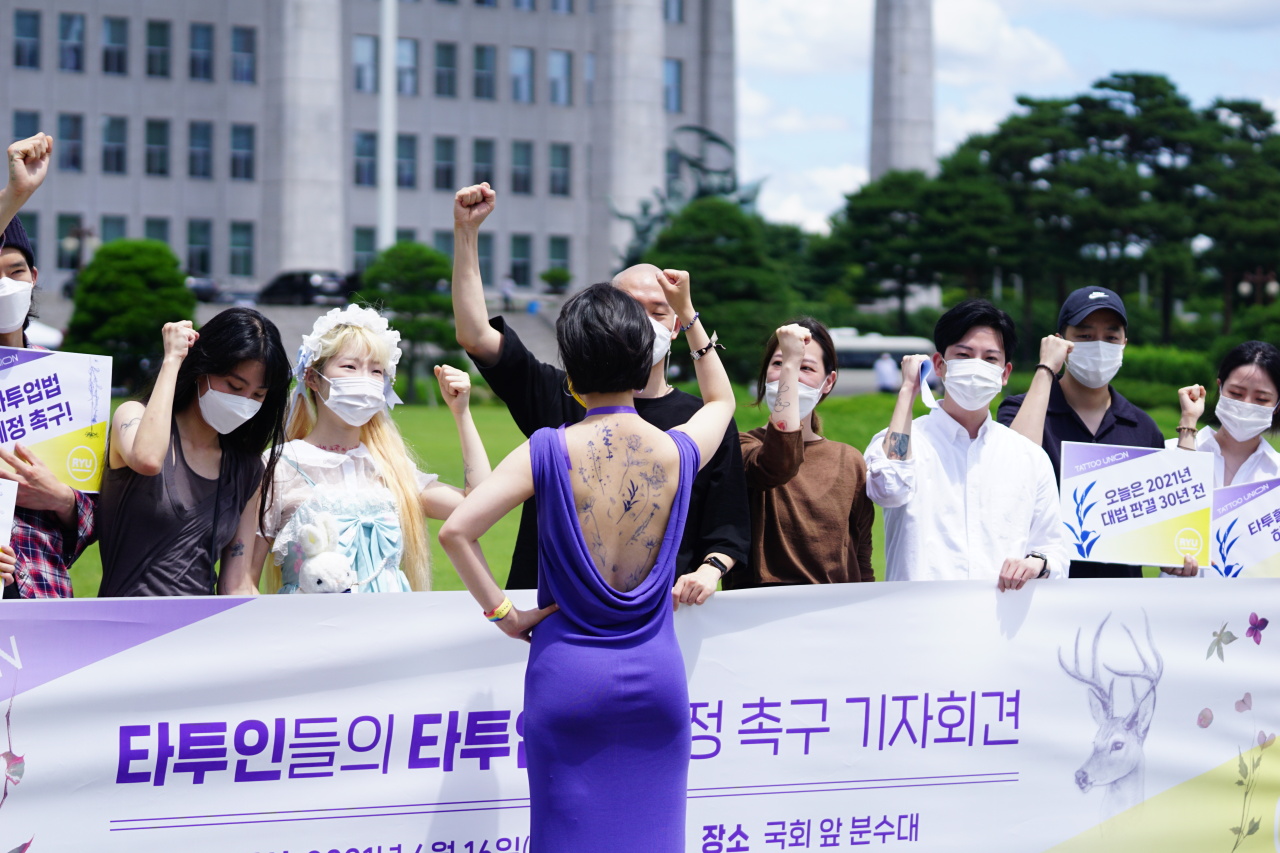Getting a tattoo is not illegal in South Korea, but having one done by an artist without a medical license is -- legislation that activists are fighting to fix, as they say it is outdated and does not fit today’s growing attitude of acceptance.
Rep. Ryu Ho-jeong of the minor left-wing Justice Party joined tattooists and advocates for a press conference at the National Assembly in Seoul on Wednesday, wearing a backless purple dress. Her back was painted with temporary tattoos in a show of support for body art as an acceptable form of self-expression.
Ryu and 11 other lawmakers proposed a bill earlier this month to modify the definition of tattooing under Korean law and to have tattooing practiced only by licensed professionals under the management of the Ministry of Health and Welfare.
The bill also proposes to have tattooists undergo safety, hygiene and related courses as a condition of certification.
“Tattoos -- these beautiful drawings and splendid phrases found easily on the street -- are still illegal here because the judicial branch ruled that way the year I was born,” Ryu said during the press conference.
“The closed-mindedness of Supreme Court justices from 30 years ago is too outdated to serve as the standard for 2021.”
Since a Supreme Court ruling in 1992, Korea has permitted only licensed medical professionals to apply tattoos. At the time, the judicial branch categorized tattooing as a medical service due to the danger of infection when ink is implanted into human skin.
Those who provide medical services without the proper license are subject to at least two years in prison as well as a fine of more than 1 million won ($900).
With such a high bar set for tattooing, most tattoo parlors here have operated outside the legal framework, while more than 1 in 5 of Korea’s people has at least one tattoo.
According to local medical device manufacturer The Standard, around 13 million people in Korea have permanent or semipermanent tattoos. At the same time, the number of tattoo service providers numbered some 350,000, though only around 10 held medical licenses.
Ryu said tattoos are a basic right that should be protected by the Constitution under freedom of expression like hairstyling, makeup and fashion. She believes the bill, if it passes, will protect the rights of tattooists and help people be legally protected in getting tattoos.
“I stand here today with unique tattoo wearers and famous artists. Don’t they look cool, pretty and beautiful?” she added during the press event.
“It’s OK if some people find them disturbing. I believe they understand their own feeling of disturbance would not serve as a reason to unlawfully take away others’ freedom and rights.”
The National Assembly’s Health and Welfare Committee is set to review the bill. It is not known how quickly it will be processed, but Ryu’s press conference has certainly drawn public attention, highlighting growing acceptance of tattoos nowadays.
Being tattooed has long been negatively viewed in Korea. Tattoos were once associated with criminals and mobsters, and it was common for those with visible tattoos to be looked down upon and discriminated against in public spaces.
But with the growing number of tattoo artists and tattoo recipients in recent years, discussions about whether to ease limits on tattooing have grown, along with the political will to bring about regulatory changes. A number of lawmakers have proposed bills similar to Ryu’s from as early as 2007, but all of them expired.
The issue also gained steam earlier this month when images circulated of BTS member Jungkook appearing on national television with bandages covering the tattoos on his hands and arms. The Korea Communications Commission prohibits showing tattoos on TV.
Doctors have consistently voiced opposition to pro-tattoo laws, saying that allowing laypeople to administer tattoos would risk public health and fail to protect those with adverse symptoms after getting tattoos.
“Tattooing involves skin damage, and infection during the treatment and adverse symptoms from improper follow-up treatments could cause grave damage to bodily health,” the Korean Medical Association said in a statement in 2019.
“Considering numerous cases of those coming to medical institutions after getting tattoos, tattooing should not be allowed as a practice for those other than licensed medical professionals.”
The KMA made the comment in opposition to a bill from Rep. Park Ju-min of the ruling Democratic Party of Korea, who sought to abolish the limit on who could legally perform tattoo procedures.
By Ko Jun-tae (
ko.juntae@heraldcorp.com)








